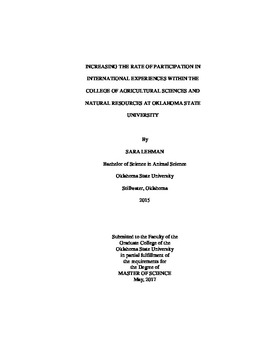| dc.contributor.advisor | Henneberry, Shida Rastegari | |
| dc.contributor.author | Lehman, Sara Lynn | |
| dc.date.accessioned | 2018-06-08T19:57:48Z | |
| dc.date.available | 2018-06-08T19:57:48Z | |
| dc.date.issued | 2017-05-01 | |
| dc.identifier.uri | https://hdl.handle.net/11244/300003 | |
| dc.description.abstract | Study abroad and international experiences have become more vitally important as employers begin seeking out candidates who are globally aware and internationally competent. Although this aspect is important, the participation rate of study abroad has been fairly low among universities across the United States. In fact, only 1.5 percent of all students enrolled in institutions of higher education in the United States participated in a study abroad experience during 2013-2014 (NAFSA, 2015). It is becoming more common for universities to have international strategic plans which commit higher education institutions to internationalization (Childress, 2009). With these plans in place, universities are striving to create an environment for their students to recognize the benefits and impacts of participating in an international experience or study abroad. Many students have perceived motivators and barriers which help them to decide whether or not to participate in a study abroad experience while attending their university. To address this issue of low participation rates, a survey was distributed to College of Agricultural Sciences and Natural Resources students at Oklahoma State University. Overall, 74.25% of participating students indicated they were personally interested in study abroad and 77.25% stated study abroad is somewhat or very important. Students were asked to identify perceived motivators and barriers as well as certain aspects of a study abroad they would most like to see when choosing whether or not to participate. Findings revealed the two biggest barriers to participating were lack of money and lack of time. The biggest motivator as to why students choose to participate in a study abroad was gaining overall life experience. The main activities students desired to have included in a study abroad program were acquiring hands-on experience and skills, learning about a different culture, traveling in country, sightseeing, and taking courses related to their major. These findings can assist program developers in tailoring study abroad experiences in which students will choose to participate. | |
| dc.format | application/pdf | |
| dc.language | en_US | |
| dc.rights | Copyright is held by the author who has granted the Oklahoma State University Library the non-exclusive right to share this material in its institutional repository. Contact Digital Library Services at lib-dls@okstate.edu or 405-744-9161 for the permission policy on the use, reproduction or distribution of this material. | |
| dc.title | Increasing the Rate of Participation in International Experiences Within the College of Agricultural Sciences and Natural Resources at Oklahoma State University | |
| dc.contributor.committeeMember | Lusk, Jayson L. | |
| dc.contributor.committeeMember | Sallee, Jeffrey A. | |
| osu.filename | Lehman_okstate_0664M_15212.pdf | |
| osu.accesstype | Open Access | |
| dc.description.department | International Agriculture | |
| dc.type.genre | Thesis | |
| dc.type.material | text | |
